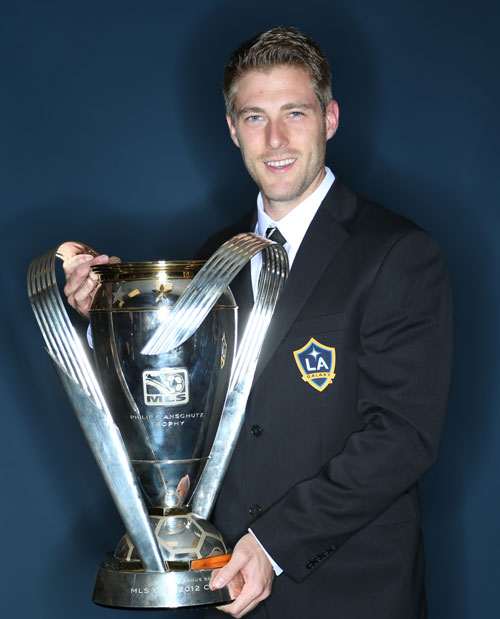
Kurt Andrews’ first year as a certified athletic trainer took him to the pinnacle of the professional soccer world.
“I was pretty lucky that my first year my team won the MLS cup,” said Andrews, referring to the Major League Soccer championship. “But, in any season, you always deal with adversity. In the first part of the season last year, we were in last place and the atmosphere was uneasy. It was like everyone was walking on eggshells. Then, we turned it around in July and won the cup.”
Andrews, a native of Rochester, Mich., graduated in the summer of 2011 with a Master of Athletic Training from the University of Arkansas. He had spent the previous summer doing an internship with the L.A. Galaxy. When the team had an opening for an assistant athletic trainer, his boss during the internship – the head athletic trainer – called Andrews. He started working full time for the team in January 2012.
“I’m in charge of the interns with the team,” Andrews said, describing his appreciation for the opportunity he had as an intern and the feeling of being on the other side such a short time later. “I try to make sure they get out of it what they deserve and what they need to learn from the real world. There are certain things you don’t learn from the classroom, things that can only come from experience.”
Andrews also handles the athletic training needs of the Galaxy Reserves, a squad made up of younger guys who need experience or players recovering from injuries. He received certification in both Functional Movement Screening and Selective Functional Movement Assessment in 2011 while at Arkansas.
Jeff Bonacci, director of the athletic training program, is a strong believer in the importance of every student doing an internship. That’s in addition to the clinical rotations students complete with Razorback athletic teams and local high school teams. Bonacci’s students have done internships with several professional football and basketball teams.
Having David Beckham, one of the world’s greatest soccer players, on their roster helped the Galaxy win the MLS cup two years running, but Andrews said Beckham is a regular guy. Beckham left his native England in 2007 to join the Galaxy. In England, the immensely popular sport is called football.
“For me, it’s just like working with any other athlete when I’m around him,” Andrews said. “He’s a normal, down-to-earth guy from England. He could be himself around us.”
Beckham was sidelined by an injury during the time Andrews did his internship with the team, but they worked together some on Beckham’s rehabilitation.
The international star, who is also frequently in the public eye with his wife, Victoria, a former member of the pop group Spice Girls, left the Galaxy and doesn’t plan to return as a player, although he has said he would like to own the team in the future.
“Having David Beckham added a lot of the spotlight and attention to the team,” Andrews said. “We always traveled with security, and he was wonderful dealing with the public. Things always went smoothly. He was open to taking pictures and signing autographs.”
The team started practicing in mid-January with its first match scheduled for early March. Andrews got a five-week break to visit family in Michigan and Kansas before returning to Los Angeles to help the team prepare. The athletic training staff works with players to help prevent injuries and treat them when they occur. The biggest change he has seen since becoming a full-time assistant athletic trainer, Andrews said, is a closer relationship with both the athletes and the coaches and other staff.
“The relationship with the players is different,” he said. “They trust you more. When you are a student, you don’t get to do a lot of work with them; it’s more observation because you don’t know as much as the staff. The players are nervous about you putting your hands on them.
“The relationship with the coaching staff is also better,” Andrews continued. “It’s easier when you go on the road. It’s a family environment. I think that’s the biggest difference – the family ties.”
Contacts
Heidi Wells, director of communications
College of Education and Health Professions
479-575-3138,